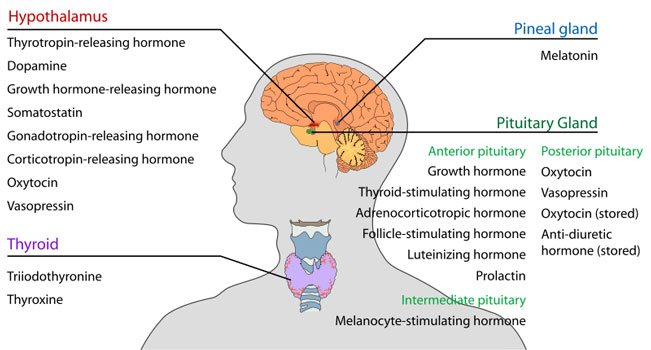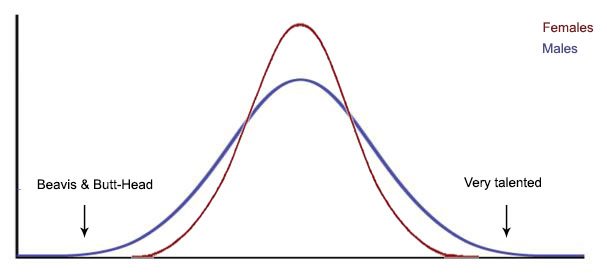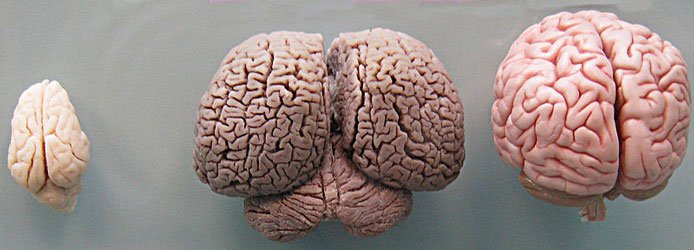
No nail-biting suspense for you!
Source: Pxhere
Curtain Open
In part 1 of this trilogy (yes, it's going to be a trilogy), I took a few stabs at the question of whether the brains of females and males are different, and I left the question there mostly bleeding and not conclusive enough for some tastes.
Well, let's not postpone the answer any further. In fact, I'll give it to you in the very first section, so that we can proceed with exploring these differences unburdened by suspense—this is no Hitchcockian endeavor, we are French European flâneur cineastes who like to roam the cinematic landscape of the science of sex differences without goal or direction, and we're proud of it!
Blood and Brains

If you have periods, your brain is different than a male's. Period.
Source: istolethetv
Do human females and males have different brains? Of course they do. If you want an aphoristically brief and irrefutable way of proving that to prospective doubters, your best bet is "period hormones". These are under the control of the pituitary gland. (For those who don't know, the pituitary gland's postal address is in the brain.) The pituitary gland is the size of a pea[1] (pea-tuitary? mnemonic device handed on a platter!), yet despite its small size it's called "the master gland" because it "controls the hormone secretion of all other glands".[2, p. 16] Hey, being tiny doesn't mean you can't do a big man's job!
This master of servants though is nothing but a head servant, because it's in turn mastered by the hypothalamus (also in the brain). If you know that female periods are controlled by hormones, you can probably guess the rest. If not, here it is spelled out:
The cyclical production of female hormones after puberty is, thus, an end result of having a female-differentiated hypothalamus, while the noncyclical production of male hormones after puberty is an end result of having a male-differentiated hypothalamus[2, p. 16]
If you have periods, your brain is different than a male's. It's really that simple. So we can declare absolutely that female brains and male brains are different.
So there you have it, women can go back to their kitchen and ... Oh, wait.
Claims that feminist aims would be invalidated were science to establish that cognitive sex differences are caused partly or totally by biological factors [...] reflect a failure to understand the scientific literature.[4, p. 245]
There's a lot of reasons behind that statement, but one of the main ones is that differences between individuals are much greater than differences between the group labelled "male" vs the group labelled "female". If you're looking to hire someone, or admit someone to a course, or offer them a teaching position, knowing their sex does nothing to help your hiring algorithm.[4, p. 245]
And/But/So how can hormone and brain differences cause cognitive differences? First, let's examine this question by the age-old method of drawing from our experience and merely thinking about it.

Sometimes all you need is an armchair.
Source: Wonderlane
Consider these things you might know from experience: after menopause, many women undergo emotional changes, including depression. Many women take estrogen after menopause for this and other reasons. This must mean that some of these changes can be attributed to lower estrogen. If lower estrogen can cause these things, we may hypothesize that its presence may cause other things. But don't just take my hypothesizing word for it:
Preliminary evidence suggests that estrogen depletion and replacement modulate a wide array of cognitive, emotional, and neurophysiological factors[5]
Again, you don't really need the research: any woman who has experienced an altered mood during her period (or pregnancy, or when she takes certain pills that influence her hormones, or when she suffers from some endocrine condition...), knows first-hand what hormones can do to you. So if men, on average, get pumped with different hormones to those of women, on average, it seems not-too-far-fetched to claim that the sexes can have different emotional and cognitive experiences. On average.

Should hormone deniers be allowed to express their views?
Source: LadyofHats
Some parties might want to keep denying that hormones can affect a woman's cognitive abilities. This denial might actually be harming women, rather than helping them.
The fact that estrogen levels influence female brains, and all that this implies, would create unfair treatment if left unacknowledged. Let's say for example someone does a study that assesses the cognitive performance of women vs men on tests. Using standard mathematical models, the researchers just average all the results, without controlling for periods. And, perhaps, the result they get from the study is that women underperform men.
But a closer look at the study might reveal that there is a percentage of women that significantly underperformed both men and the average of the rest of the women. And maybe this odd finding happens in every single study. Could it be that this is a natural result of women cycling into and out of their periods? This question cannot be asked if the influence of hormones on brains is ruled out from the get-go.
For example, one study determined that female scores on a mental rotation test were bimodal; 80% of the women scored approximately the same as the male group, whereas a second group of women (20%) scored much lower than the men and remaining women [...]. Such an observation, although rarely addressed by traditional statistical tests, could reflect the fact that female performance on visuospatial tasks appears to fluctuate on the basis of estrogen exposure [...], with the implication that a constantly changing subset of normally cycling women tested at any given time might show depressed performance on such a task.[5]
In other words, it's possible that women in fact don't perform worse than men on certain tests. Or, rather, they do perform worse, but only on certain days of the month. If we remove those days, women might be found to perform equally well to men.
If this is true, it would bring into question the following two (more traditional and more popular) interpretations of the data:
(a) there is a fixed subpopulation of women whose visuospatial ability is always lower than the male average; or (b) women, as a population, have lower mean performance than men.[5]
Most studies, it bars mentioning, do not control for menstrual cycles. It would be kinda ironic, if the reason they don't control for this was in order to avoid being accused of sexism, and in their doing so they promoted sexism!
This is one of the reasons why science (and any method of questing for truth) must be no holds barred: every hypothesis must be allowed to be entertained and explored freely. Or we risk achieving the opposite of what we set out to do: in this case, properly assessing the brain differences of women compared to men.
And if we ask the question, then maybe we can do the experiment, and maybe we can get results that confirm our hypothesis:
For normally cycling females, performance on spatial tests, including the MRT, is at its lowest when estrogen and progesterone levels are at their highest [...]. For young males, performance on spatial tests varies with testosterone levels (though not linearly) and peaks in the spring[8]
Note that spatial-performance sex differences are some of the most studied and solid differences in the literature. It wouldn't hurt if we knew that, during the greater part of the month, they're not as pronounced as we thought.
A not-so-personal anecdote

A common male-female bell curve pattern.
Source: Own work.
When I was a teen, we lived in a pre-PC era, and the question of whether boys are smarter than girls, of "men superior to women", cropped up often enough, mostly in a jocular fashion. But I wasn't just any teenager. I was a teenage philosopher! (Sadly, the film version didn't take off like I Was a Teenage Werewolf did. People's tastes are weird.)
So in my spare time, solving matters a priori, as philosophers do, I asked myself this same question: are men smarter than women? The only knowledge I had back then that pertained to the issue, was the men and women I knew in real life, and the men and women I knew in books and other areas of human creativity, like movies and music. It seemed to me quite obvious that men performed better than women in any area I cared to think about, "even cooking" as I liked to put it to people to whom I introduced this theory. I was already aware of the feminist argument that women were simply oppressed, not allowed to express their talents, hence the overrepresentation of male genius in the world. But for several reasons that I won't go into right now, that didn't seem to me like a satisfactory explanation.
However, I could also not discount the fact that most of my peers (fellow males) that I knew in real life, were actually quite stupid (to use the pre-PC term). And the average female in my class could easily be said to be their better. I also noticed that girls tended to perform more or less the same as each other, whereas boys varied much more, with some boys not caring about school at all, and being very reactionary and sometimes violent (to the point of physically attacking teachers — yes, beating up teachers is not uncommon in Cypriot classrooms), whereas other males outperformed all males and all females and then some. (I personally, if I may toot my own horn just a bit, may have even outperformed some of my tutors, if finding mistakes in their tests — and having to explain it to them at length until they finally got it (I'm talking about areas such as mathematics) — counts as outperforming them.)
-.jpg)
Pink Floyd's The Wall is literally incomprehensible in a country where it's students who beat up teachers.
Source: Andy Mabbett
So I arrived at the following theory: the average man may be equal or even in many cases inferior to the average woman in terms of intelligence; but there is that one male — that one male in 100, or 1000, who knows? — whose intelligence will be like that of 10 or 100 other men combined, and who will simply blow any female out of the water.
I'm trying to express it in a way very close to how I would've expressed it back then — controversially, as I liked to do — which is why it sounds so exuberant and teen-agy.
Thing is — and the reason I'm mentioning this anecdote — is that I still hold this opinion to this day (the essence of it, at least). Is it because I'm a chauvinist? The reason, I'm afraid, is much less catchy than that: my teen opinion is borne out by the research.
You see, it's a well-established fact in the area of cognitive sex differences that:
a much higher overall variance in measures of performance on cognitive tasks has been observed for males as compared to females [...]. This is consistent with evidence of a much higher proportion of males at the high end of the cognitive spectrum (e.g., genius categories; [...]), as well as at the low end (e.g., having neurodevelopmental disorders including retardation, autism, dyslexia, and language disorders; [...]). Commenting on this phenomenon, Geschwind and Galaburda (1985) suggested that males may be at risk for both cognitive disability and genius, due to early exposure to a "male factor," which was most likely testosterone.[5]
It's interesting how much truer this sounds when you couch it in scientific language like that, even though it's practically the same as what I said!
But let's de-jargonize it. Pictorially, what the quote is saying is that the male bell curve squats a bit lower than the female bell curve (which is how you do a proper squat, see Starting Strength), with the result that the love handles get squished out a bit to the sides, the left and right, with the result that males get to have more idiots (left) as well as more geniuses (right).
Those left and right ends are referred to as the tails of the bell curve, though I prefer to call them the ends of a twirled mustache, because the curve looks more like a mustache than a bell to me.

How I see a bell curve.
Source: GDJ
The graph at the beginning of this section is my own work, and does not represent any real numbers, but it does represent a shape that you typically find in the sex differences literature. See here if you want a couple actual graphs.
Back to the quote, the greater variability of males is attributed to a "male factor", that research says is simply testosterone.
As to the reasons why testosterone might have these effects, it is hypothesized that estrogen may have a protective effect, compared to testosterone, against certain early let's call them mutations (I call them mutations, rather that disorders, because they may be beneficial, as in the case of geniuses). In rats, for instance, "progesterone has been shown to act as a neuroprotectant against cerebral trauma in female rats" and "female rats show better cognitive recovery from both neonatal and adult lesions as compared to males".[5]
But whatever is protective, is also an anti-mutagen. In other words, if I may use this analogy, estrogen might promote monocultures, whereas testosterone favors wild accidents, which promotes variety, and often leads to happy accidents (geniuses), but also unhappy ones (Butt-Heads).
And it's kinda ironic, in a salt-added-to-the-wound way, to think that this may happen to women at the biological level, when it so clearly happens to them at the social level too, where women are often told to do as is expected of their sex, promoting less variance and happy (or unhappy) accidents, whereas men are allowed, even encouraged, to experiment and try new things. It seems women are attacked on both sides, bottom-up and top-down, biologically and social-constructedly.
And it's kinda baffling to me, that the authors who introduce this hypothesis, go on to say the following:
The concept that estrogen may play a protective role in females could account for the smaller number of females in the lower tails of cognitive distributions, although it does not account for observations of lower incidence of cognitive genius in females.[5]
They go on to hypothesize that — maybe due to some miracle? — "Perhaps the plasticity resulting from ovarian effects and chronic cyclicity carries (statistically) a cognitive price. Restriction of range at one end of the distribution may cause a restriction at the other end as well."
I don't know what lack of biological knowledge might've led the authors to fail to acknowledge that idiots and geniuses are just value terms we give to these conditions, and that both are, from a biological perspective, what we may broadly call "mutations" (though this does not mean they are restricted to the genetic level), and as such can cause differences at both ends of the mustache, since that mustache is actually socially constructed: there's no biological reason to place genius at one end and Beavism at the other, it's just an old guy pulling some of his facial hair to the left and some to the right and then twirling it. If you have explained one tail of the Dalí mustache, you have explained the other. Males are simply more amenable to mutation (broadly construed). The explanation for all mutations is the same. As Geschwind and others put it:
sinistrality, learning disabilities, mathematical genius, and immunological disorders are all linked biological phenomena[9]
Btw, is it me or is this post getting long again?
Not to worry! Homeopathy tells us that if we do more of the same, it will alleviate the pain. So let's treat this post's excessive length by making it even longer!
Do hormones affect behavior?
As we saw in the last post, Nature does not have moral qualms, unlike humans. So she provides us with quite a lot of experiments that would be thrown out by an ethics committee of touchy-feely humans. One such experiment is congenital adrenal hyperplasia.
Congenital adrenal hyperplasia is a condition in which the body fails to make certain enzymes. Enzymes are, to put it crudely, proteins that turn something into something else. You can view it as a river that has certain processing plants along it, and those plants are the enzymes. If you have functioning enzymes, the river runs along quite well. If you have a mulfunctioning enzyme, the whole process downstream is affected. The water builds up. In congenital adrenal hyperplasia, the thing that builds up is androgenic hormones.
The effects of this are masculinization of physical traits (like genitals that more resemble a male's, or excessive facial hair) and, more importantly for our purposes here, masculinization of behavior:
Several studies of AGS patients revealed clear evidence of behavioral masculinization [...]. Even with early treatment, these girls described themselves and were described by others as more tomboyish and higher in energy expenditure than their unaffected sisters. They preferred outdoor activity, boys' toys, male playmates, and utilitarian clothing. Adrenogenital girls also demonstrated a low interest in marriage and maternal behavior coupled with early interest in careers and sex-role ambivalence.[10, p. 229]

An example of utilitarian clothing?
Source: 412designs & Wikimedia Commons in the United States public domain, modified
Another kind of (unintended) experiment (this time by human fault) that shows that androgen hormones can be behaviorally masculinizing, has to do with synthetic progestins. These used to be prescribed to women to lower the chances of unwanted abortion[4, p. 266]. Their daughters were thus exposed to more androgens. Again, the effects were twofold. One had to do with their genitals. The other had to do with behavior (which was compared, when possible, to unaffected sibling controls). The affected women and men:
were found to be more independent, individualistic, self-assured, and self-sufficient in comparison with their unexposed siblings. There were no significant differences in IQ between the exposed and unexposed siblings[10, p. 230]
Another study assessed the aggression potential of such individuals. The study "demonstrated consistent and robust sex differences in physical aggression scores across samples drawn from young children to college students"[10, p. 230]
And one more tiny section before we close! (Hey, it's been 2 weeks since my last post, you had plenty of time to rest.)
Does brain size matter?

Source: Tursiops_truncatus_brain_size.JPG: Boksi derivative work: Looie496
This will be a quickie. It will only take about a minute.
Male brains are bigger. That's because males overall are bigger. This fact in isolation might give the impression that males might possess not just a bigger brain, but more brains.
But if we couple this fact to another, namely the fact that female brains are neurally denser, we get a different picture:
The neuronal densities of brains of females are significantly higher than the densities of males' brains [...]. Put another way, although the female brain is about 100–150 cubic centimeters smaller than the male brain, females and males have the same total number of neurons. [7, p. 119]
There. It's a brief section, but I thought it worth mentioning.
Curtain Close
You got blood, you got brains, you got hormones. What more could a reader want? Hopefully, the above will have cleared up some of the relations between hormones, brains, and behaviors, and how these may produce what we view as the stereotypical woman and man.
As a reminder, we're still on the subject of John Money's attempt to give criteria on the basis of which we can distinguish males from females. The criterion at hand here being brains. But brains are too interesting to just do a single post on them like I did with gonads and chromosomes. Hopefully, I'll be done with brains in the next one.
REFERENCES
1. Wikipedia contributors, "Pituitary gland," Wikipedia, The Free Encyclopedia, https://en.wikipedia.org/w/index.php?title=Pituitary_gland&oldid=828004997 (accessed April 5, 2018).
2. Mealey, L. (2000). Sex differences: Developmental and evolutionary strategies. Academic Press. https://www.sciencedirect.com/science/book/9780124874602
3. SF Witelson, II Glezer and DL Kigar. Women have greater density of neurons in posterior temporal cortex. Journal of Neuroscience 1 May 1995, 15 (5) 3418-3428; DOI: https://doi.org/10.1523/JNEUROSCI.15-05-03418.1995
4. Levy, J., & Heller, W. (1992). Gender differences in neuropsychological function. In A. A. Gerall, H. Moltz, & I. L. Ward (Eds.), Handbook of behavioral neurobiology (Vol. 11). Sexual differentiation. New York: Plenum. https://www.springer.com/gp/book/9780306439834
5. Roslyn Holly Fitch, Patricia E. Cowell & Victor H. Denenberg (2009) The female phenotype: Nature's default?, Developmental Neuropsychology, 14:2-3, 213-231, DOI: https://doi.org/10.1080/87565649809540710
6. Bennett A. Shaywitz, Sally E. Shaywltz, Kenneth R. Pugh, R. Todd Constable, Pawel Skudlarski, Robert K. Fulbright, Richard A. Bronen, Jack M. Fletcher, Donald P. Shankweiler, Leonard Katz & John C. Gore. Sex differences in the functional organization of the brain for language. Nature volume 373, pages 607–609 (16 February 1995) doi:10.1038/373607a0 https://www.nature.com/articles/373607a0
7. Falk, D. (1997). Brain evolution in females. In L. D. Hager (Ed.), Women in human evolution. New York: Routledge. https://books.google.com.cy/books/about/Women_In_Human_Evolution.html?id=6Tl8g2uQNaIC&redir_esc=y
8. Geary, D. F. (1996). Sexual selection and sex differences in mathematical abilities. Behavioral and Brain Sciences, 19, 229-284. https://www.researchgate.net/publication/279976798_Sexual_selection_and_sex_differences_in_mathematical_abilities
9. de Lacoste MC, Holloway RL, Woodward DJ. Sex differences in the fetal human corpus callosum. Human neurobiology 5(2):93-6. February 1986. PMID: 3733479. https://www.researchgate.net/publication/19427415_Sex_difference_in_the_fetal_human_corpus_callosum
10. Reinisch, J. M., & Sanders, S. A. (1992). Prenatal hormonal contributions to sex differences in human cognitive and personality development. In A. A. Gerall, H. Moltz, & I. L. Ward (Eds.), Sexual differentiation: Handbook of behavioral neurobiology (Vol. 11). New York: Plenum. https://www.springer.com/gp/book/9780306439834
Earlier Sex Differences episodes:
3: Sex Differences: Do females and males have different brains?
2: Sex Differences: Check out the gonads on that one!
1: Sex Differences: Does the Chromosome Maketh the Man?
steemSTEM is the go-to place for science on Steemit. Check it out at @steemstem or browse the #steemSTEM tag or chat live on discord
